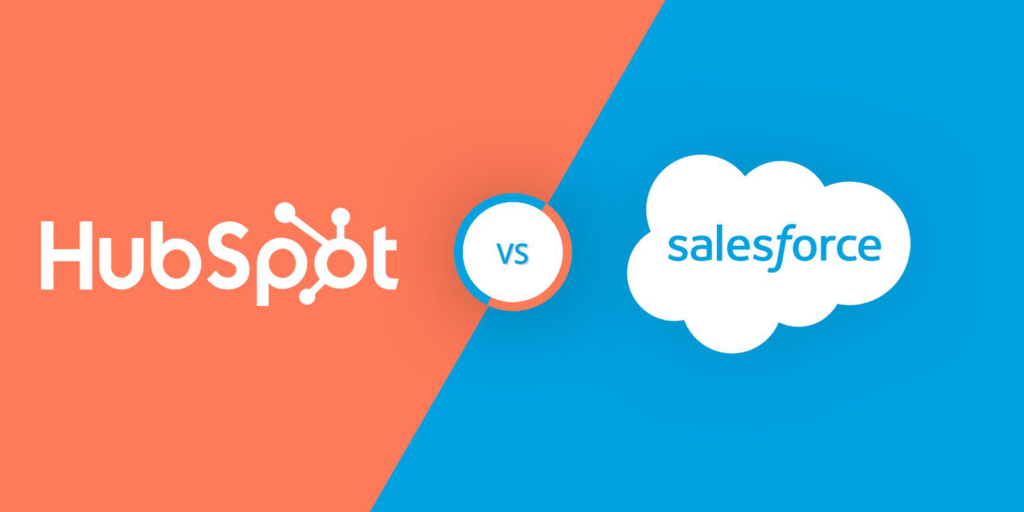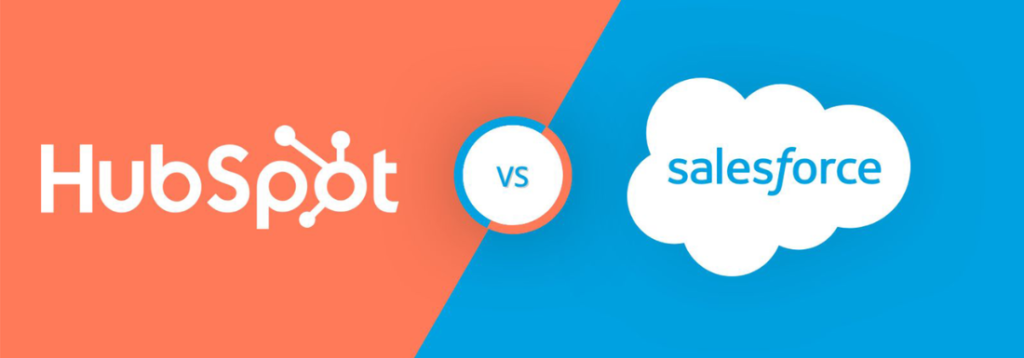In today’s business world, having a strong Customer Relationship Management (CRM) system is crucial. But with so many options available, choosing the right one can be overwhelming. Two of the biggest names in CRM are HubSpot CRM and Salesforce. Both offer powerful features to help businesses manage contacts, track sales opportunities, and boost growth. But which one is right for you? This blog post will do a deep dive into a HubSpot CRM vs. Salesforce: Head-To-Head Comparison (2024). We’ll explore their strengths and weaknesses, pricing structures, and ideal users to help you make an informed decision.

HubSpot CRM vs Salesforce: Understanding CRM Systems
Before we dive into the specifics, let’s understand what a CRM system does. A CRM is essentially a digital address book on steroids. It helps businesses store and organize customer contact information, track interactions (emails, calls, meetings), and manage sales pipelines.
HubSpot CRM vs Salesforce: Key Differences
Here’s a breakdown of the key differences between HubSpot CRM and Salesforce:
-
Ease of Use: HubSpot CRM is known for its user-friendly interface and intuitive design. It’s easy to set up and navigate, even for those new to CRM systems. Salesforce, on the other hand, is more complex and requires some training to get the full benefit of its features.
-
Features: Salesforce offers a wider range of features, especially for complex sales processes. This includes advanced sales automation, powerful reporting and analytics, and extensive customization options. HubSpot CRM focuses on core CRM functionalities but integrates well with marketing automation tools.
-
Pricing: HubSpot CRM offers a free forever plan with basic features, making it a great option for startups and small businesses. Salesforce doesn’t have a free tier, but it does offer a 30-day free trial. Paid plans for both CRMs scale based on features and number of users.
-
Customer Focus: HubSpot CRM is geared towards inbound marketing, attracting leads and nurturing them into customers. Salesforce is more sales-focused, with features designed to close deals faster.
Here’s a table summarizing the key differences:
| Feature | HubSpot CRM | Salesforce |
|---|---|---|
| Ease of Use | Easy to learn and use | More complex, requires training |
| Features | Core CRM functionalities, marketing automation focus | Extensive features, advanced sales automation, customization |
| Pricing | Free plan available, paid plans scale | No free plan, paid plans scale |
| Customer Focus | Inbound marketing, lead nurturing | Sales-focused, deal closing |
Who Should Choose HubSpot CRM?
HubSpot CRM is a perfect fit for:
-
Small and medium-sized businesses (SMBs): With its user-friendly interface and free plan, HubSpot CRM is a cost-effective option for SMBs getting started with CRM.
-
Businesses focused on inbound marketing: If your strategy revolves around attracting leads and converting them into customers, HubSpot CRM’s marketing automation tools can be a valuable asset.
-
Teams new to CRM systems: The ease of use makes HubSpot CRM a great option for teams unfamiliar with CRM software.
Who Should Choose Salesforce?
Salesforce is a good choice for:
-
Large enterprises: With its powerful features and scalability, Salesforce can handle the complex sales processes of large businesses.
-
Businesses with long sales cycles: Salesforce offers tools to manage and nurture leads throughout lengthy sales cycles.
-
Teams needing advanced customization: Salesforce allows for extensive customization to fit the specific needs of your business.
Choosing the Right CRM: Additional Considerations
Here are some other factors to consider when choosing between HubSpot CRM and Salesforce:
-
Integrations: Both platforms offer integrations with various business tools. However, Salesforce has a wider range of integrations due to its larger app marketplace.
-
Scalability: If you anticipate significant growth, consider which platform can scale to meet your future needs. Salesforce is generally considered more scalable for large enterprises.
-
Customer Support: Both HubSpot and Salesforce offer customer support. However, HubSpot is known for its exceptional customer service, often included in its pricing plans.
Conclusion
Ultimately, the best CRM for your business depends on your specific needs and budget. HubSpot CRM is a user-friendly and affordable option for SMBs and inbound marketing-focused businesses. Salesforce is a powerful and scalable solution for large enterprises with complex sales processes.By considering the factors mentioned above, you can make an informed decision and choose the CRM that will help your business thrive. HubSpot CRM vs Salesforce: Head-To-Head Comparison (2024) will make you easy for you select proper CRM.
Choosing the right CRM can feel overwhelming, but don’t worry! If you’re located in India and need help navigating these platforms, Websenor can be a valuable resource. Websenor provides experienced HubSpot developers and Salesforce developers who can help you implement, customize, and optimize your chosen CRM to fit your specific business needs. Whether you’re a small startup or a large enterprise, Websenor can help you leverage the power of CRM to streamline your sales process, nurture leads, and ultimately achieve your business goals.







